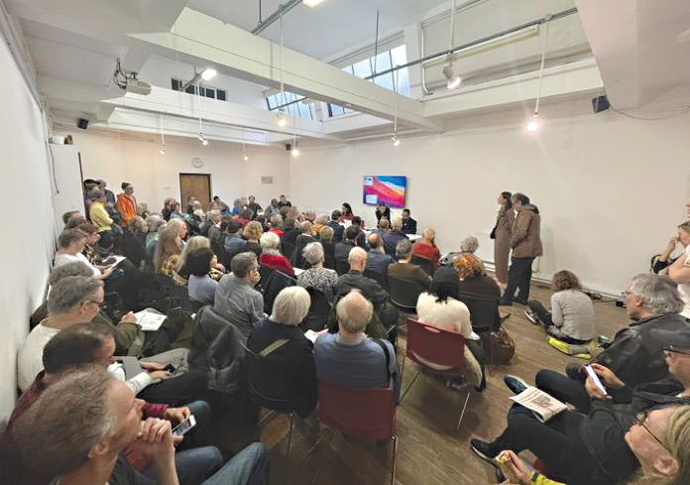Eco 2023: How we unveiled a melting pot of climate ideas at the ‘North London COP'
We held our own conference at Conway Hall
Friday, 6th January 2023 — By Anna Lamche

Packed out sessions at the NLCOP in November
NOW the dust has settled, critics look back on November’s COP27 and see an international conference that largely failed on its own terms – highlighting the vital role local communities have to play in achieving change.
As the international jamboree unfolded in the pavilions and conference halls of Egypt’s Sharm El Sheikh, the New Journal staged a “North London COP” of its own in Conway Hall in Holborn.
Our event was organised alongside our sister paper, the Islington Tribune, in response to the fear that those in power are failing to heed the urgent warnings of experts and scientists.
Crowds poured through the doors to visit the exhibition hall, showcasing the best of local campaigning and activism, and there was standing room. Ideas were shared and passionate debates waged among both our panellists and audience in a rousing show of the power and dedication of local people to tackle global climate change.
At the same time, on the international stage, global powers agreed a historic but ill-defined agreement on a “loss and damage” fund.
While the details are yet to be hammered out, the basic idea underlying the policy holds that countries in the global north will provide financial assistance to nations most vulnerable to climate change. But critics argue last year’s international COP failed on its own terms.
If Glasgow’s COP26 was geared towards defining the targets capable of halting the climate crisis, Egypt described COP27 as a time to implement these pledges.
This goodwill was undermined by the huge numbers of delegates with links to the fossil fuel industry who were in attendance. The language shifted from preventing climate change to mitigating its worst impacts.
No legally binding targets to reach net zero or limit global heating were agreed. Since then, business has carried on much the same as usual. The disappointing outcome of this international effort only underlines the power of local communities to achieve change.
As people lose faith in governments to achieve the “root and branch transformation of our economies and societies” that the United Nations demands, it’s clear we must look closer to home for answers.
Hence our summit at Conway Hall. In the wake of Just Stop Oil’s disruptive actions, we held talks on how far protests should go, and debated how we can talk with children about the climate crisis.
We examined the role of the media in achieving change and heard from former co-leader of the Green Party Sian Berry, as well as Age of Stupid and Rivercide filmmaker Franny Armstrong.
Our conference laid bare our community’s concern for the climate crisis – and revealed the surge of energy we must harness if we are to achieve change. November’s NLCOP was the first of many.
Going forward, our conference is set to become an annual event, a place where we can come together to share ideas and work out our next steps as we move into an uncertain future.
Last year was one of the hottest on record in the UK, with temperatures hitting 40 degrees over the summer months.
Internationally, we watched as floods decimated Pakistan and extreme drought parched the Horn of Africa, triggering disease and famine, while sea levels rose yet again, claiming yet more precious landmass from low-lying countries and islands.
While the climate crisis is a global problem, we must never lose sight of the power of our local communities in the drive to combat the defining challenge of our age.
We look forward to seeing you for our next conference later this year.